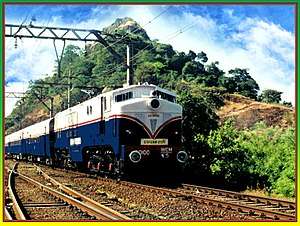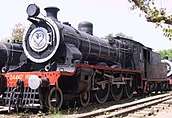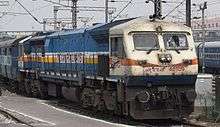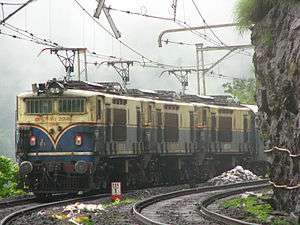Indian locomotive class WCM-5
The Indian locomotive class WCM-5 is a class of 1.5 kV DC electric locomotives that was developed in 1956 by Chittaranjan Locomotive Works (CLW) for Indian Railways. The model name stands for broad gauge (W), Direct Current (C), Mixed traffic (M) engine, 5th generation (5). They were the very first locomotive of any kind fully developed and built in India. They entered service in 1961. A total of 21 WCM-5 locomotives was built at CLW between 1961 and 1963.
| Indian locomotive class WCM-5 | |||||||||||||||||||||||||||||||||||||||||||||||||||||||||||
|---|---|---|---|---|---|---|---|---|---|---|---|---|---|---|---|---|---|---|---|---|---|---|---|---|---|---|---|---|---|---|---|---|---|---|---|---|---|---|---|---|---|---|---|---|---|---|---|---|---|---|---|---|---|---|---|---|---|---|---|
 A WCM-5 hauling the Deccan Queen | |||||||||||||||||||||||||||||||||||||||||||||||||||||||||||
| |||||||||||||||||||||||||||||||||||||||||||||||||||||||||||
| |||||||||||||||||||||||||||||||||||||||||||||||||||||||||||
| |||||||||||||||||||||||||||||||||||||||||||||||||||||||||||
| |||||||||||||||||||||||||||||||||||||||||||||||||||||||||||
The WCM-5 served both passenger and freight trains for over 39 years. With the introduction of more modern types of locomotives and 25 KV AC electrification, all were withdrawn in early 2000s after repeated failures. Today one locomotive is preserved with rest of the locomotives have been Scrapped.
History
the history of WCM-5 begins in the early 1960s with the stated aim of the Indian Railways (IR) to remove the aging fleet of WCG-1 and WCP-1 class locomotives working in the Central Railways (CR) .[1] So IR to procure 21 1500 V DC electric locomotives from Chittaranjan Locomotive Works (CLW), who also previously supplied Steam locomotives to India. They are manufactured in India in 1954-1955.They were the last “nosed” locomotives of any type to be manufactured.[2]
The WCM-5 locomotives were used on many Express trains like the Deccan Queen, Indrayani Express etc as well as in Freight Duties. The Deccan Queen had WCM-5 with a matching livery until 1990s. In mid 1990s the aging WCM-5 began to fail regularly causing disruption in train services. So Central Railways decided to withdraw these locomotive from services and by 2000 ,all units were withdrawn.
Preserved Examples
| Class | Manufacturer | Loco Number | Previous shed | Name | LIvery | Location | ref |
|---|---|---|---|---|---|---|---|
| WCM-5
Chittaranjan Locomotive Works |
20103 | Kalyan | Cream/Lightblue with red lining | Preserved at Howrah Rail Museum | [3] |
Former sheds
- Pune
- Kalyan (KYN)
- All the locomotives of this class has been withdrawn from service.
See also
References
- Gudgin, D.S.E. (1976). Vulcan Foundry Locomotives 1832–1956. Truro: Bradford Barton. ISBN 978-0-85153-215-8.CS1 maint: ref=harv (link)
- "Refer pg 282" (PDF).
- "Rail Museum". www.museumsofindia.org. Retrieved May 26, 2020.
External links
| Wikimedia Commons has media related to Indian locomotive class WCM5. |



